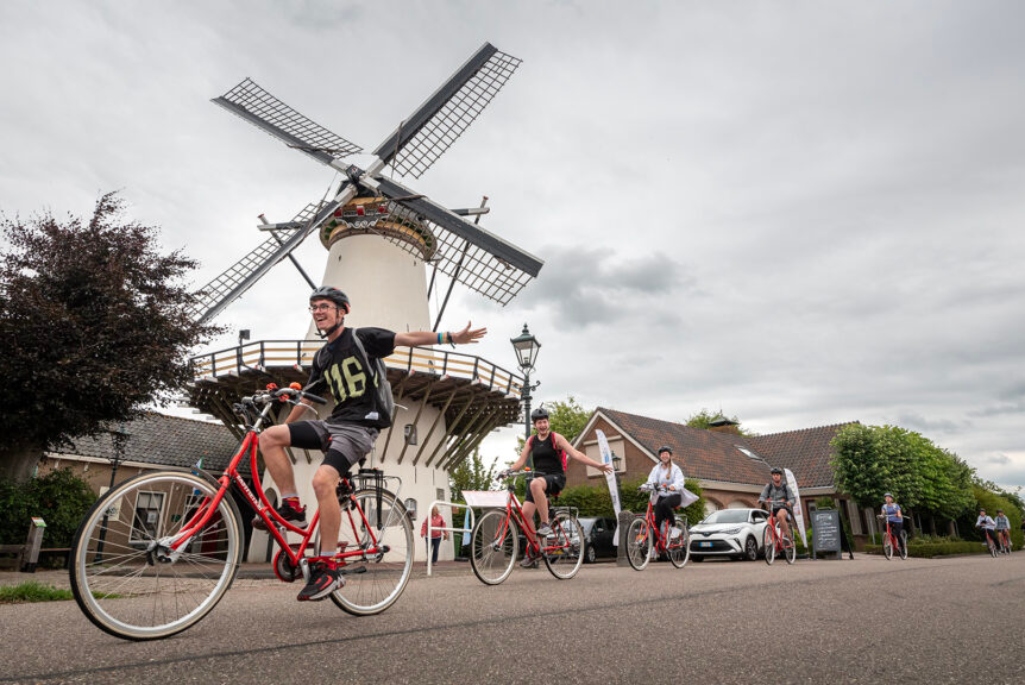
Jackson Gainor, high school senior whose family serves with the IMB in England, rides through a small town in the Netherlands. Jackson loved using traditional Dutch transportation — bikes — to get from town to town on the week-long mission trip.
Music and laughter waft up the path long before the teenagers on reddish-orange rental bicycles make an appearance. The long, single file line of Americans meander through the Netherlands countryside while locals zip past on their own bikes. When the team comes to a traditional Dutch windmill that serves as a rest stop, they dismount, feeling a little stiff and saddle-sore from the two-hour ride. The discomfort isn’t enough, however, to keep the horseplay and teasing from happening.
The teens’ playful energy draws an elderly couple over to visit. The man smiles big as he listens to their account of riding bikes from town to town in the rain.
“You are getting the real Dutch experience,” he says, noting that most in his country ride bikes — rain or shine — as their chosen transportation. The high school juniors and seniors explain their trip isn’t as much about biking as it is talking about Jesus with people they meet. The man holds up a hand to stop the conversation, shakes his head “no” and walks away.
For most evangelical Christians here, this is the real Dutch experience — a lack of interest in anything spiritual. The Netherlands is like much of Europe where only about 1 percent claim Jesus as their Savior on the continent. The teens on this volunteer mission trip find the indifference almost normal. As children of International Mission Board missionaries serving in Europe, or third culture kids, they’ve grown up amid spiritual lostness — but it doesn’t mean they accept it.
“My heart breaks just to know I’m walking past so many people who don’t know Jesus,” Arin Hesskew, whose family serves in Poland, tells her fellow missionary kids at the nightly debrief. “I don’t even know how to begin to pray for everyone we pass. It’s overwhelming to think so many we talked to don’t know Jesus.”
Heads around the table nod in understanding. They’ve watched their parents and local partners intentionally share the Gospel through the years. Now, thanks to the help of some church connections from Florida, Oklahoma, Mississippi, Missouri and Tennessee who offered mission trip scholarships and served as prayer partners, it’s their turn to share that same message.
Trent and Courtney Livingston welcomed the group of high schoolers to work with their IMB team conducting surveys and inviting people to a local church for an Alpha course introducing the basics of Christian faith. The survey cards are designed to lead all conversations to Christ. It’s just one simple question: “What’s the most important thing in your life?” The multiple-choice answers include money, family, peace, purpose, freedom, hope and love.
The Livingstons encourage the teenagers to follow up the answers with, “Why?”, then share about the most important thing to them — their faith in Jesus. Courtney smiles at the small group of students working with her and encourages them to give it a try.
A man in his 20s walks past, and Jackson Gainor, whose family serves in England, stops him to chat. The rest of Gainor’s team circles around to join the conversation. The teenagers’ energy, smiles and fun-loving spirit is contagious and opens this man to talk. He chooses money as the most important. But as the teenagers share their own answers to the question, the man changes his answer a few times before finally telling the group that religion “just doesn’t feel like me.”
This answer is a common one for the week. One of the teenagers jokes about it being an emotional roller coaster — one minute someone laughs in your face but then the very next person shows interest in knowing more about Christ.
“It might have been awkward at first, but we still shared the Gospel,” Jackson says, adding that he was definitely out of his comfort zone at the beginning of the week but by the end talking about Jesus felt natural. “This was a chance for me to see that evangelism isn’t really that hard — it’s just a conversation.”
As a former youth minister, this answer makes Trent smile. He believes evangelism is something people “catch” by going out and doing it. He points out this team shared with 250 people as part of a “broad seed sowing” project, something he could never do that quickly on his own. The survey results help his team know what areas might be open to the Gospel, allowing the Livingstons and their local partners to pinpoint more effort there.
Trent and other organizers of this mission trip want to continue to build the confidence of the youth to live intentionally on mission. The adults also wanted to give these missionary kids a “youth group” experience — a chance to hang out with other teens; a time to laugh and be silly. As many missionaries do not attend traditional churches, these teens don’t often experience the youth activities common in U.S. churches. More important than the experience of the trip, however, is the opportunity to grow in their faith and impact Europe by planting Gospel seeds.
“Thank you,” Arin says to the Southern Baptist churches and individuals who helped make this trip happen: Hillcrest Baptist Church, Pensacola, Fla.; Swanberg Christian Ministries; Hopeful Baptist Church, Lake City, Fla.; First Naples, Naples, Fla.; Mississippi Baptist Convention; Calvary Clearwater, Clearwater, Fla.; Second Baptist Church, Springfield, Mo.; First Baptist Church, Plant City, Fla.; First Baptist Church, Concord, Tenn. and First Baptist Church, Tulsa, Okla.
(EDITOR’S NOTE – Sue Sprenkle writes for the IMB.)


